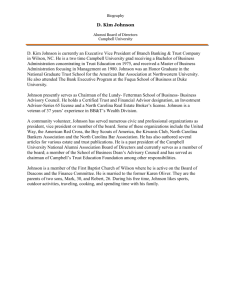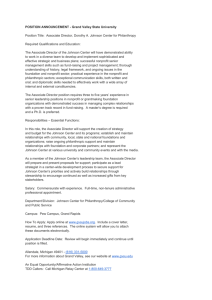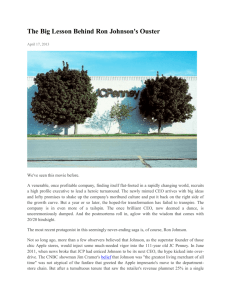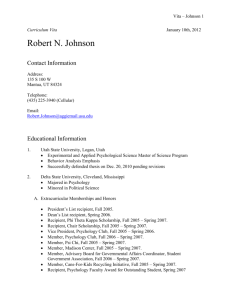Le style est l`homme meme
advertisement
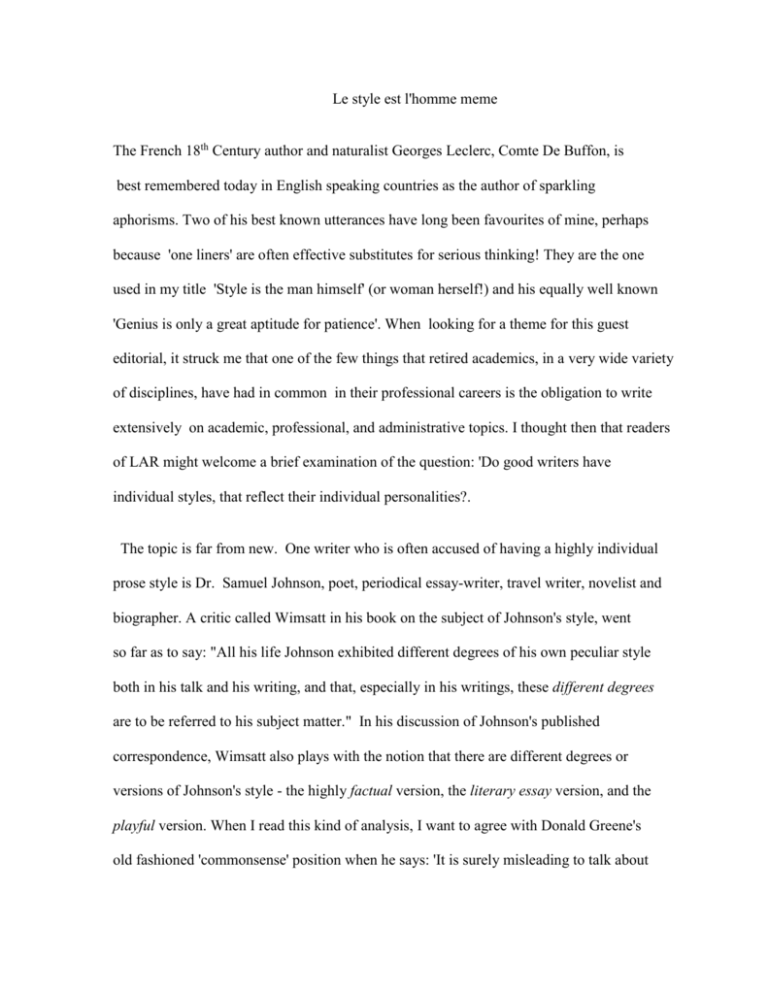
Le style est l'homme meme The French 18th Century author and naturalist Georges Leclerc, Comte De Buffon, is best remembered today in English speaking countries as the author of sparkling aphorisms. Two of his best known utterances have long been favourites of mine, perhaps because 'one liners' are often effective substitutes for serious thinking! They are the one used in my title 'Style is the man himself' (or woman herself!) and his equally well known 'Genius is only a great aptitude for patience'. When looking for a theme for this guest editorial, it struck me that one of the few things that retired academics, in a very wide variety of disciplines, have had in common in their professional careers is the obligation to write extensively on academic, professional, and administrative topics. I thought then that readers of LAR might welcome a brief examination of the question: 'Do good writers have individual styles, that reflect their individual personalities?. The topic is far from new. One writer who is often accused of having a highly individual prose style is Dr. Samuel Johnson, poet, periodical essay-writer, travel writer, novelist and biographer. A critic called Wimsatt in his book on the subject of Johnson's style, went so far as to say: "All his life Johnson exhibited different degrees of his own peculiar style both in his talk and his writing, and that, especially in his writings, these different degrees are to be referred to his subject matter." In his discussion of Johnson's published correspondence, Wimsatt also plays with the notion that there are different degrees or versions of Johnson's style - the highly factual version, the literary essay version, and the playful version. When I read this kind of analysis, I want to agree with Donald Greene's old fashioned 'commonsense' position when he says: 'It is surely misleading to talk about 'Johnson's prose style' - he had at least half a dozen at his disposal'. The phrase 'at his disposal' seems to me to underline the fact, that although subject matter and intended audience affect any writer's stylistic choices, it is characteristic of good writers that authorial personality may be the deciding factor in making stylistic choices. When I returned to full-time teaching and research after some years in the administrative wilderness, the 1940's style-meaning debate had been radically altered by new critical dogma about the autonomy of the work of art, and the irrelevancy of any discussion of the author's stylistic intentions. My graduate students would wince when, in my old-fashioned way, I started to talk about an author's style. The new dogma was that style is never an extrinsic expressive function, but merely an extension of meaning. I was assured that there were not different ways or 'styles' of uttering a single 'content', and that those individual styles, which I, in my innocence, had thought might sometimes be the author consciously altering the expressive quality, or emotional values, of his thoughts or 'mental content' of his writing, were only analysable in terms of the work of art itself. It would be contended that Samuel Johnson himself, had got it all wrong when he wrote to Boswell in 1778 (in a marvellously 'Johnsonian' sentence) "Why, Sir, I think every man whatever, has a peculiar style, which may be discovered by nice examination, and by comparison with others: but a man must write a great deal to make his style discernible to others." There do seem to me to be several confusions in the academic debate as to whether there is any such thing as a 'personal' style and how it is created. The way I personally write seems to me to be an interaction of a number of factors, and that the creative process is an interaction of all these factors. The first factor is 'ingrained habit' - the habitual and semi-automatic choices of diction, word-order, and the like that I am in the habit of using. When I think about what I have written, on virtually any topic, I am acutely aware that my brain seems to be a 'creature of habit'! It tends to repeat familiar clusters of images and concepts, and to use the same words to describe these images. The second factor is 'conscious literary choices' , based on subject, genre and intended audience. I cannot persuade myself that when I wrote, as I have done scores of times, a paper for a learned journal that my stylistic choices were of the same kind as when I wrote a family letter to my sister Ruby in Dundee, or a contribution to the correspondence columns of a local newspaper. The third set of factors are purely extraneous, non-literary, factors of a commercial or career kind. If I know I will not get published by a major publishing house unless I conform to their 'house' style, I might well modify my personal style to meet their requirements, or if I know I will receive a large fee, as opposed to a small fee or no fee at all, for a thousand well chosen words, I would be a liar not to admit that that non-literary factor might affect the time I spend on polishing the style of the piece! Variations in my personal style may well be explained by the predominance or absence of some of these factors. Now that I am in my seventies, I write less and less, which may be a mistake. Just as my doctors tell me that my stiffening knee joints might profit by the judicious and prudent use of physical exercise, it may well be that my mind, as well as that of my fellow septuagenarians, might similarly profit from regular verbal exercise. RHC


